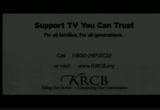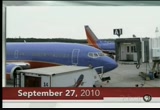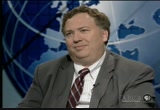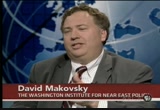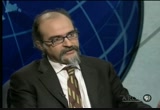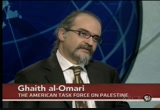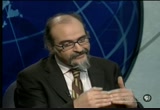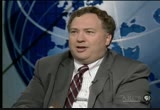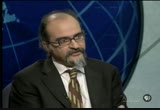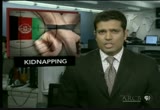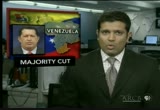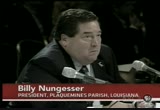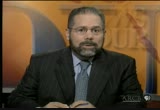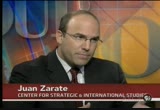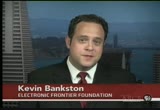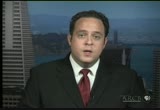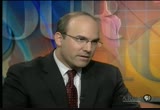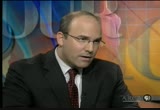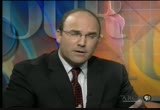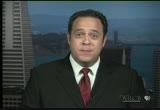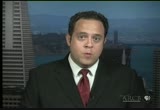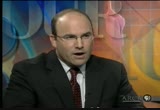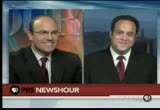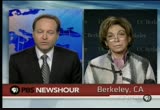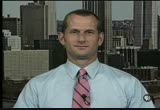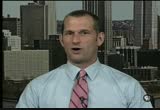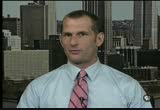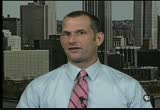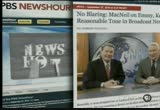tv PBS News Hour PBS September 27, 2010 10:00pm-11:00pm PDT
10:00 pm
captioning sponsored by macneil/lehrer productions >> ifill: good evening. i'm gwen ifill. palestinian president mahmoud abbas said there will be no "quick decision" on the future of the middle east peace talks. >> brown: and i'm jeffrey brown. on the newshour tonight, middle east analysts david mckovsky and ghaith al omari assess the situation after the israeli government let a moratorium on settlement construction in the west bank lapse. >> ifill: then ray suarez leads a debate about a new proposal that would allow federal authorities to extend wiretapping to online
10:01 pm
communications. >> brown: we talk to laura tyson, president clinton's chief economic adviser, the third in our series of conversations on extending the bush-era tax cuts. >> ifill: special correspondent ben barnier reports on the french government's controversial decision to deport gypsies to romania and bulgaria. the rona deportations have been happening quietly for years, they became a hot button political issue when one was killed at a political check point. >> brown: margaret warner gets the details on the merger between low-cost rivals southwest airlines and air tran. >> ifill: that's all ahead on tonight's newshour. major funding for the pbs newshour has been provided by:
10:03 pm
and with the ongoing support of these institutions and foundations. and... this program was made possible by the corporation for public broadcasting. and by contributions to your pbs station from viewers like you. thank you. >> ifill: the future of middle east peace talks was up in the air again today, as negotiators waited to see if settlement construction would begin again on the west bank, and palestinians would walk away from the table. >> for the first time today in nearly a year there was nothing to stop jewish settlers from building homes in the west bank. but for the most part all remain quiet.
10:04 pm
at a small settlement in the southern west bank, a long bulldozer plowed fresh earth but that construction had been approved before the building moratorium went into effect last november. on saturday at the united nations, palestinian president macmoud abbas who had lobbied for israel to extend the freeze said israel has a choice to make between settlements and peace. still during a trip to paris today he said with the stakes so high he will delay any decision about whether the missed deadline is a deal-breaker . >> we will not have now any quick reaction. we will not say "yes" or "no." we want or we don't want. we need to study all the results and consequences. a real deep study with the palestinian leaders. but also with with the arab countries. we have decided with the arab countries during my meeting with foreign ministers in new york, that the arab followup committee will hold a meeting on october 4th. >> even as settlers celebrated the moratorium's
10:05 pm
expiration, israeli prime minister benjamin netanyahu advised restraint. today his spokesman said the peace process should go forward. >> prime minister netanyahu called upon president abbas to continue with these talks because ultimately, onlythrough ongoing, serious direct talks, can we build a better future for israelis and palestinians. >> reporter: netanyahu faced heavy pressure from his governing coalition to resume construction of settlements. but others in the government's more moderate wing like israeli president shimon peres urged caution. >> our fate has been and remained hinged on the peace process. we cannot put the things that we have achieved at risk. we where in a period of some uncertainty, a sort of passing crisis. i hope that whatever happens we cannot stop efforts to achieve a cleat peace-- complete peace. >> reporter: direct talks restarted in washington with abbas and netanyahu at the white house just over three weeks ago.
10:06 pm
a state department official said today the u.s. was disappointed that israel allowed the building moratorium to expire. u.s. official middle east envoy george mitchell heads back to the region tomorrow with stops in israel and ramallah. both sides have accepted an invitation to resume talks in paris next month. >> ifill: for more on what's holding these talks together so far, we turn to ghaith al-omari, the advocacy director for the american task force on palestine, and a former advisor to president abbas. and david makovsky, senior fellow at the washington institute for near east policy and the co-author of "myths, illusions, and peace." for let's talk about myths, illusions and peace, gait al on ari. what happened today. why didn't the palestinians walk away from the table as they promised they would if the settlements were not frozen. >> because they realized that the price of walking out from the talks is very high s very high from a domestic strategic perspective. ultimately they have no choice. and if you want to get a
10:07 pm
palestinian state the only way to get is through negotiations and they realize that. and secondly from a foreign policy perspective, they realize walking out twice now would create isolation for the palestinians. the palestinians would lose the american president, would lose europe, and so this is not an easy decision to make. and ultimately one that has to be done with examining all of the consequences. >> david mckovsky, so why didn't israel, i don't know, just throw a little bit on the table and extend this freeze or this moratorium. they don't like the word freeze, for a few more months? >> which think netanyahu had three sets of calculationsment one is reciprocity, the other one is one of relevance and the third one is one of consistency. he feels that when george mitchell put forward the idea in 2009 it would be as confidence builders. israel, you do some on settlements. arab states, you take steps to normalizing israel. now maybe mitchell didn't get 100% of what he wanted because he wanted a full freeze as he said, but maybe he got 95% of what he wanted.
10:08 pm
but the arab states, i think, did 0% in terms of moving towards israel or even funding the palestinian authority properly. so that was, so therefore, the feeling of they're-- there is no res prosity here. and there is also the issue of consistency. the palestinians derided this more tore yum because it wasn't a full tloted 100% freeze it didn't officially include east jerusalem even in practice there were restrictions on east jerusalem. and basically netanyahu would say look, how could that which is inconsequence suddenly become indispensablement you know, we frittered away nine out of the ten months because you said this wasn't sufficient. now you are saying you need this to be extended. the third issue is one of relevance, which is that these are all symptoms. like ghaith was saying, the idea has to be the cure. let's get to the core, cut to the chase, and deal with the land dimension of this conflict. and if you do that, then there is no more issue of settlements because there is a border. if you are inside the border you are not called a settlement, you are called
10:09 pm
israel. >> reporter: i should let you respond to some of that, especially the part about whether the palestinians were bringing anything to the table in this. >> no, i think, look, the palestinians have been quite serious with the buildup to the negotiations in terms of what they have done on the groundin terms of security work. and now with the negotiations. they do want to deal with the core issues. but ultimately there is this political obstacle of the settlement moratorium. i think what we are seeing right now, we're seeing an attempt to fine-tune a package. a package that includes a slowing down of settlements, construction one way or another. that includes other things on the ground, in terms of allowing palestinians further security jurisdiction, allowing for an economic development , allowing some of the obstacles but i think it is realized here i would agree with david, that if we keep on getting stuck at every crisis that we see across, that will come across the road reabout-- we will get nowhere. this will be a very difficult process. let's jump straight and deal well end game. >> let's assume that everyone agrees for domestic pressure reasons and international pressure
10:10 pm
reasons that he had are not going let this sticking point be the sticking point. so has anything else been accomplished so far, any movement that you have heard about in these talks? >> well, i think the key is that they focus first on security and borders. and that, you know, the end-to-end this 40-year-old friction issue over the settlement. and because basically the viewers of the newshour have been following this story but don't always keep up with all the fine details. they are saying has there been any progress anywhere? the fact is the last time around, the diffences between the site over the land was only 4%. and each side knows what the other one wants in terms of borders and security. >> so we should have an agreement tomorrow. >> it just means to me that there is actually something achievable. people, no ones whatever gone broke being cynical about the middle east. selling the middle east short. and there's reason for that. but at the same times what's lost in all the cynicism and skepticism is the fact that on the issue of land which people think is the be all and end all, the differences are narrow. and that is what gives the
10:11 pm
obama administration in my view correctly so, a belief that, you know this part is doable. what might be harder to do are what i would call the narrative issues of this conflict, jerusalem and refugees. >> let's talk about that, mr. onari. one of the things if it is true if you agree that in fact 96% of this is clear, and 4% has to be worked out, who has the pressure, the power. in the israeli case is what the u.s. can bring to the table or in the palestinian case what the arab can bring to the table. >> most certainly. the arab league has created the right kind of instrument, the arab peace initiative. they offices in beirut, an arab summit which basically says if there is peace between palestinians and israelis, if israel reaches a deal with syria, then israel is not only getting peace with two countries t is getting peace with all of the arab world and all the muslim world. this is part of the package. the other parts of the package is that each deal there will be security currencys this is important given what is happening in iran. beyond i iran. so what are you seeing is a
10:12 pm
package. the arab countries unfortunately have not yet done enough turning this from a grand offer and an all or nothing proposal into a more operationalized one this is what david was taing about. how do we get to a virtual-- where israel does something, and there is reciprocity and vice versa where one success builds upon the other. >> we're not there yet. >> we're not quite there yet. unfortunately the first month since the logic of the talks, the ox then-- oxygen has been sucked by the settlement moratorium. that is why i will be very glad when this is out of the way, once we resolved this one way or the another and let's start moving to things that matter. as i think david has said and many said before, once we-- all of these things in retrospect will look like details. let's put this out of the way and get to wt we know as former negotiate shalls and former officials can be done. >> is it out of the way or it just being pushed aside and everyone is agrees not to make this the breaking point. >> i don't know. i would hope ghaith is right. i'm concerned we have an arab league meeting coming
10:13 pm
this monday. and i think that, you know, the momentum is going to build during this week to make sure that the u.s. efforts behind the scenes and give secretary of state clinton and her team credit. whether it was in her trip to the middle east or all we in new york. really trying to work something out here. and i think defense minister barak of israel, five extra days, abbas was there, and now blair, middle east envoy tony blair and barak and netanyahu huddled, this is a holiday week in israel. to try to see, there a u.s. paper now on the table. and the goal is to use the seven days to work this out so this issue is diffused. so by the time the arabs convene their arab league meeting, this issue is off the table. as ghaith said there is an historical interest here because, in fact, when the israelis got out of gaza they pulled out 8,000 settlers. they got out-of-egypt, they pulled the settlers out of
10:14 pm
the sinai so, when it came to war and peace, the parties ultimately do find a way but right now this obstacle is hanging out there. >> and how optimistic are you about getting past that obstacle. >> i'm very optimistic. i simply ask not imagine the other side coming to the u.s. president, president obama and saying here, we're handing you a failure one month not process. it's unthinkable, inconceivable at the moment. as i said i think the strategic interest of palestinians and israelis is only through a negotiated process. they might position and posture and do brinksmanship but ultimately there is no other option in the long term but to negotiate. >> ghaith al onari and david mckovsky, thank you very much. >> brown: still to come on the newshour, monstering on-line communications >> brown: still to come on the newshour, monitoring online communications; keeping some of the tax cuts; deporting immigrants from france; and merging two low-cost airlines. but first, the other news of the day. here's hari sreenivasan in our newsroom. >> sreenivasan: nato and afghan troops stepped up pressure on taliban fighters in southern afghanistan today.
10:15 pm
it was part of a new offensive to reclaim the insurgent stronghold of kandahar. the combat phase of operation dragon strike began several days ago. at the same time, "nato" helicopters based in afghanistan, carried out weekend raids into pakistan that killed at least 50 militants. pakistani officials protested the raids as violations of their sovereignty. afghan authorities worked today to win the release of a missing british aid worker. she and three afghan colleagues were kidnapped sunday in an ambush. all are employed by a consulting company that works on projects for the u.s. agency for international development. the local afghan governor tried to reassure the british government today about the woman's fate. >> i'm hopeful that we will succeed. we have weigh asked religious leaders and local elders to help us and i'm sure that as afghans traditionally respect women, she will be released soon. we have sent a group of elders to talk with these kidnappers and our struggle will continue until we ensure the safe and quick
10:16 pm
release of this woman. >> sreenivasan: also today, there was word that a brother of afghan president hamid karzai is now under investigation in the u.s. the "wall street journal" said federal prosecutors are looking at mahmood karzai for possible tax evasion and racketeering. he has denied wrongdoing. opponents of venezuelan president hugo chavez made major gains in sunday's elections there. they celebrated after the results came in early today. chavez and his allies did maintain control of parliament, but they lost their two-thirds majority. without that margin, chavez will no longer be able to rewrite laws unchallenged. he came to power in 1998, and has strongly opposed u.s. policy in the region d the world. president obama has signed a bill creating a $30 billion loan fund for small business. senate republicans had blocked it for months, warning it would encourage risky lending. the president said today it would lead to more hiring by small business. he called it a "great victory for america's entrepreneurs." earlier, the president rejected
10:17 pm
house republicans' new pledge to america. he said it's not a serious approach to fixing the economy. b.p. and local officials in louisiana clashed today over how the gulf oil spill was handled. b.p.'s chief operating officer, doug suttles, told a presidential commission that the coast guard was in charge of the response at all times. but the president of plaquemines parish, billy nungesser, said he could not get answers from the federal command center in homah, louisiana. b.p. would say it was coast coast gaurd, the coast gaurd said it was b.p.. it became a joke that the command was a "wizard of oz", some guy behind a cur taken because we never got a name, we never got a person in charge we could call and say hey, are we going get it or not. >> sreenivasan: testimony on the spill response continues tomorrow. the commission plans to issue its report in november. wall street started the week on a losing note after friday's big gains. the dow jones industrial average
10:18 pm
fell 48 points to close at 10,812. the nasdaq was down 11 points to close at 2369. this was the hottest day ever recorded in downtown los angeles. the national weather service reported a reading of 113 degrees just before noon. the old record was 112, set back in 1990. california has been suffering through a heat wave since late last week. those are some of the day's major stories. now, back to gwen. >> ifill: next, a proposal to expand government's power to monitor internet communications. ray suarez has that story. >> suarez: the story has to do with secrecy versus privacy. the "new york times" reported this morning that the obama administration is drafting legislative proposals that would make more of the internet open to court-ordered wire taps. that could include currently encrted emails, possibly social networking web sites like facebook, and web-phone conversations on services like skype. the reported proposals have raised concerns among privacy
10:19 pm
advocates. for more, we turn to juan zarate, a deputy national security advisor in the bush administration. he is now a senior advisor with the center for strategic and international studies. and kevin bankston, senior staff attorney for the electronic frontier foundation, a digital civil liberties group. juan zarate, let's start with you. why would the federal government be looking for new powers to eaves drop on these communications devices, aren't these covered under earlier, preexisting law? >> well, what the government would say, ray, is that this would be a modernization of existing law. the law that was passed and signed by president clinton in 1994, the communications assistant to law enforcement act, which requires telecommunications carriers an providers to allow government access, and have intercept capabilities for communication. the government says now, and i think we know this from experience, that the communications have evolved. evolved on the internet with peer to peer messages, end-to-end endescription, voice over ip communications,
10:20 pm
in a way that doesn't allow the government either access in the first instance or speed to be able to wiretap appropriately. and so i think the idea here is you have new technologies evolving all the time that are being used more and more by people. and the government wants to avoid these dark alleys that exist in the virtual world where they can't necessarily monitor the way they could, for example, tp conversations. >> kevin bankstons are there new technologies that make it harder for the government to look in. >> there are a great deal of new technologies that the internet has abled to allow us to communicate with each other. but the fact is this proposal would be a drastic and costly anti-privacy, anti-security, and anti-innovation solution to a problem that doesn't exist. the fact is, based on the government's own reporting, law enforcement investigators in the 2500 wiretap these did last year, encountered endescriptio endescription-- encryption
10:21 pm
only once, and that encryption did not prevent them from getting the communication they were after. so the idea that we should, based on vague warnings that criminals are going dark, rearchitect the entire internet to make it more easily tapable by the government is simply ludicrous. >> suarez: well, what would software developers, hardware developers be required to do under these new regs, kevin? go ahead. >> well, we don't have a proposal. we don't have hard language but looking to the requirements currently applied to telephone companies and broadband access providers, capabilitys that are already quite broad, this would, apparently, require every provider of any type of communication service on the internet to build into their systems, facilities to ease government wiretapping and access to user data or face hefty fines. and i think part of the issue here is would mark zuckerburg been able to
10:22 pm
build facebook and launch it from his doorm room if-- dorm room if he had to build capabilities and get fined for it or would skype have been built if they were forced to foregot peer to peer communication and create an artificial bottleneck so the government can wiretap your call, i think the answer is no. >> suarez: a problem that doesn't even exist, mr. baanston gave an example. >> i don't agree. i think if you look at end to end encryption which is a reality today, government doesn't have access to those communications between users. peer to peer communications, again, government often has difficulty accessing those communications. and what happens is, and this goes to the issue of costs as well, the government is often railroaded to go in, help the technology provider actually build in the post facto intercept capabilities to try to then pullout the information about communications. two other things i would say,
10:23 pm
though, ray. one is the fact that this is in some ways a prospective proposeal that is to say i think government is anticipating that there will continue to be innovation at a speed with which with the government can't keep up. and so the idea here is to, as in 1994, put the onus on the private sector to build in the capabilitys to actually intercept in a way that maps what was done in 1994. but doesn't infringe on technological own vacation or on privacy. there are serious issues here though, no doubt there are good questions that need to be asked. some of these technologys were not built with this in mind. certainly people engage there skype communications, for example, assume that they are not being monitored am but the other thing i would say is, from what i understand from the proposals there is no idea here that this would be a kir sum-- circumvention of the wiretap laws, this would have to be authorized. it would still have to be the normal rules of minute miization. the other thing the government has to do on any
10:24 pm
wiretap currently done so in some ways this is a little bit of a tempest in a teapot before we've actually seen the proposal. >> suarez: but so much of the emphasis in recent years has been on making these systems more secure for commerce, for instance, making the systems harder to break into. and kevin bankston is suggesting that the designers up front would have to design a way to get into them, and give it to somebody. in this case, the federal government. >> or have access to it. that is exactly what happened in 1994 when we were looking at the wireless networks that were developing as well. same arguments were made about crushing innovation at that point. i think it's fair to say that that didn't happen. but it's a fair point. it's a good question as to how this is going to be implemented. the costs that would be imposed on the private sector, that is a real issue. but i think from the government's perspective, it's the inability to access some of these communications. the growing use and volume of these communications. and the speed with which th're able tthen monitor, all of which is hindered
10:25 pm
under current law. >> kevin bankston? >> there simply is no record as of yet to support the conclusion that these technologies are posing an insurmountable problem for law enforcement. what there is a record of, however, is how these so-called lawful intercept programs have actually posed a threat to secureity. the most powerful example is in greece in 2005, lawful intercept systems for cell phones were hacked into by outside parties and use to spy on the greek government itself including its prime minister. more recently, reports are that the chinese intrusion into google systems exploited the lawful intercept systems that google had. so when with you build these back doors into our communications facilities, not only do we face the risk of overzellous investigators abusing them, we also open up the risk of hackers, criminals and foreign government as becausing them. >> what about mr. zarate's concern that technology has
10:26 pm
been advancing rapidly and a the government has been forced to play catch-up. that there are places that conspirators can go where even if there's a really good idea of where they are, they simply can't be heard. and the proper channels have been gone through and a court has issued a warrant and so on . >> conspirators have always been able to go dark, tas were, by talking face-to-face. and even though the government with a court order has the authority to secretly search your home or install an eavesdroping device, we would never consider requiring home and office builders to build in a government-spying peephole or preinstall eavesdropping microphones into our homes and offices. we wouldn't allow that in the off-line world and we shouldn't allow it in the on-line world. >> but the thing i would say is that precisely the baseline that president clinton signed into law in 1994.
10:27 pm
that was the essence was that the telecom industry had to provide assistance to law enforcement. that law enforcement into itself didn't have the capabilitys to intercept communications in a way as the technology was evolving. and so the question here is should the internet services that have evolved now without twhees requirement ares be required to provide that kind of access. and i always say the mere fact that hackers are going to be out there, criminals are going to be out there trying to exploit weaknesses, that is going to happen anyway. that to me doesn't strike me as a good argument as to why you would not allow government with judicially approved warrants access to communications, especially on a realtime basis if there is something urgent happening. and we know the way the terrorist networks work, international organized crime works, they rely on the internet. the networking, the capabilities of communicating transnationally, not meeting in person, in the 21st century to expand their capabilities and to cause threats to the united states. it's just a reality of the 2 1s century. >> what about that restraint
10:28 pm
and quickly, mr. bankston k a compromise be worked out that leaves both parties able to get what they need? >> frankly, i think forcing companies to architect our network to be opened to government surveillance is fundamentally opposed to the values 6 an open and free society which with the administration itself recognized when it recently criticized the united arab em brat-- emirate for proposing just this sort of thing and threatening to block blackberry encrypted e-mail. we strongly opposed -- >>. >> suarez: and juan zarate, gentlemen, thank you both. >> thank you, ray. >> thank you. >> brown: to another in our series of conversations >> brown: and to another in our series of conversations about whether to extend the bush-era tax cuts. last week we heard from former bush advisor glenn hubbard, who argued in favor of keeping the tax breaks for everyone, and from former federal reserve chairman alan greenspan, who took the opposite view, calling for letting them all expire. tonight we turn to laura tyson. now a business professor at u.c.-berkeley, she served as head of the council of economic
10:29 pm
advisors under president clinton, and currently sits on president obama's economic recovery advisory board. welcome to you. >> thank you very much. it's a pleasure to be with you. >> brown: so you think we should let the tax cuts for the wealthy laps. what's the argument for doing that? >> well w i actually think we have to step back and say what are the problems. and then once you know what the problems are, i think you can get to that solution. one problem is the jobs deficit. another problem is the fiscal deficit. and i would say also ones that's not mention toad often is the growth deficit. so the decisions we make about tax affect all of those things. in the jobs deficit case we're talking about a lack of aggregate demand . that means we certainly don't want to allow all of the bush tax cuts to expire right now. that would be-- not be a good policy because those expirations will effect the purchasing capabilities 6 the american household but at the same time we have this long run deficit
10:30 pm
problem and i think we need right now to not only be introducing policies to handle the jobs deficit but we have to have a credible plan on the table for multiyear deficit reduction. and i believe part of that plan is most likely to be a expiration of the tax cuts for its top two income tax brackets. it's a lot of money. it's over $3 trillion over a ten-year period. we have a big deficit problem. this is an important source revenue to help handled that problem. >> brown: but we also, as you say, have a jobs and economic growth problem so you know the argument against what you are suggesting. we heard it from glenn hubbard, we hear it from republicans, we hear it from even a few democrats, that this is the wrong time to let any of these tax cuts laps. >> okay, well, i think, let me distinguish here ideal policy from a compromise policy. my ideal policy would be to allow the top two brackets to expire at the end of this
10:31 pm
year, to move off of the bush tax cuts for the top two to three percent of the american population. to take the result aring additional tax revenue which is probably on the order of $35 to 40 billion dollars next year, and to take that money and spend it on job job-- job-creating programs. the congressional budget office itself has done an analysis of 11 different programs, ways you could stimulate job growth. retaining the bush tax cuts for the top two percent is number 11 on the list in terms of effectiveness. it's not as effective as giving grants to state and local governments. it's not as effective as unemployment compensation. it's not as effective as a temporary payroll tax reduction targeted at employment. or spending on infrastructure. so by all means we have to worry about the jobs deficit next year-- . >> brown: excuse me but that is -- >> excuse me for interrupting but i was just thinking that even though the argument that we hear often is that among those top earners are small businessmen, and women who
10:32 pm
create jobs. >> right. well, unfortunately, that is a very misleading statement. sure there are some small businesses in those top two income brackets. but the reality is that only about 2 to 3% of all small business filings, every tax year are in the top 2 to 3-- 2-- the top 2 income tax brackets. so we're really talking about 98% of small business filings would not be affected by allowing the bush tax cuts for the top two income tax become ets to expire on schedule. >> brown: now coming at it from the other side, the other problem that you've talked about, the deficit and the growing debt problem because i talked to alan greenspan last week. he famously testified in favor of these tax cuts in 2001 but now he thinks we should let them all laps backs-- lapse because the debt problem, he thinks, greatly outweighs with the potential slowing of growth
10:33 pm
because if we let the tax cuts laps e. >> well, he is making a judgement that we can handle, that we need the tax cuts that have been introduced for the middle class and the lower income groups. he's making a judgement that those tax cuts have to expire for deficit reduction. i think we have to have that conversation. i think there are many things that need to be on the table for the deficit reduction package. i think they include looking seriously at social security. they include looking seriously at medicare and medicaid. how about defense. how about other kinds of tax issues. i actually think ideally, truthfully, what i would like to sehappen is that we look at a deficit reduction package in the context of a tax reform. we have a very, very complex,
10:34 pm
messy, expensive unfair tax system which is not very progrowth in the way it's organized. so i think while i agree completely with alan that we will need more revenue as part of the way to solve the deficit challenge we have, and i've already mentioned that the top tax cuts for the top income earners will generate 3 trillion dollars of deficit over the next ten years if we didn't get rid of those things, these are big numbers, but i think weological should look broadly at all of the issues that are part of deficit reduction. >> brown: and when i interrupted you before, and i apologise again, but you were making the practical case was that you had used that money for what, for more stimulus? >> well, i would say for more spending right now. look you're-- no, in this case, remember, stimulus means you're spending without a revenue stream. what i was saying is if you allow the top two rates to go back to prebush levels, back to the clinton levels
10:35 pm
when the top two income groups were doing extremely well as they've been doing extremely well for the last ten years, let the bush tax cuts expire for the top two income tax brackets. that generates revenue of about 40 billion dollars. use that revenue to fund spending programs that we know from congressional budget office analysis and analysis by mark zandy of moody.com and others, we know that those programs will have a much bigger effect on addressing the jobs deficit than simply keeping the lower tax rates for the top two income tax brackets. this is a matter of what is effective and i want to use the revenue we would collect from allowing the bush tax cuts to expire for the top to be used for job creating programs. >> brown: an one last thing, another issue that is out there, is if we do extend the tax cuts for the majority of people as you're
10:36 pm
arguing and as the president argues, the president argues, seems to be arguing for making that permanent. i gather you don't, do you think that is a good idea to make it permanent now or just do it temporarily and see where we're at? >> i-- i-- i guess i come down to the fact that we should do a temporary extension for a few years and put that issue on the table as part of a broad deficit reux-- reduction discussion. the big items that have to be address ready tax revenue, social security, medicare and defence. we should discuss what to do with the permanence of the bush taxuts or eliminating the bush tax cuts entirely or reducing them, whatever, in the context of making up that plan. that is the credible thing that we must do quickly, laura tyson, thank you very much. >> thank you. >> and we'll have other conversation about extending the tax cuts. >> now to europe and its gypsy, the french
10:37 pm
government's efforts to expel immigrants known >> ifill: now, to europe and its gypsies. the french government's efforts to expel immigrants, known as the roma, have stirred opposition within france and from some of its european partners. we have a report from ben barnier of global post, the international reporting web site. >> people are being deported from france back to their home country of romania. they are all the the rona or gypsies. the french governments has argued they are living here illegally in some 300 settlements. this year france has expeled more than 8,500 rona other smaller expulsions are happening in belgium and italy. they have been happening quietly for years. it became a hot button political issue in july when a gypsy was killed at a police check point. then a police station was attacked in retaliation. president sarcozy said french would crack down on illegal settlements. they say the move was designed to boost the sagging support.
10:38 pm
but reactions were swift. >> the rona must return home. they are illegal status. they are living on someone's territory where they shouldn't be. they should go back to romania. that is normal. >> they are here. without work and without papers and without money and so they are better in their country. >> you know t might be exaggerated but it makes me think of-- it is rather scandalous. >> those people are human beings and i don't see why they are expeled. they shouldn't be. this is so-called country of equality. it is not t is a racist country. it i think the government is racist. >> that negative feelings echoed up to the highest ranks of the european union at a meeting of 27 leaders in mid-september. the eu justice commissioner commissioner-- linked french's
10:39 pm
frances expulsion to the-- ban. >> i personally have been appalled by a situation which gave the impression that the people are being removed from a member state of the european union just because they belong to an ethnic minority. this is a situation i have fought europe and would not have to witness again after the second world war. >> commissioner redding later acknowledged that the comparison was exaggerated but sarkozy replied andry. >> all heads of state and government were shocked by the outrageous statements made by the vice president of the commission. it was deeply shocking to see someone page such historically charged remarks that have profoundly hurt the whole of our countrymen. >> as this rona community on the outskirts of paris, the trailer home form a makeshift street. children run around and women cook for their families but life is tough. most rona don't speak french and know they are ron the fringes of society.
10:40 pm
>> i have been living here for ten years. i don't have a job. i don't have enough food. >> reporter: the government doesn't break its criminal statistics down by communities. but police say rona sometimes resort to criminal activity and beging to support themselves. rona have actually been the target of repression and prejudice for hundreds of years. during world war ii, nazis killed hundreds of thousands of gypsies in central and eastern europe. in occupied france, they survived an interment camps. three years ago the population in france increased dramatically. when bulgarian ro plania joined the eu which meant its citizen kos cross into france freely. but french law said bulgarians and romanians couldn't stay more than three months if they couldn't obtain work permits and didn't have means to support themselve or if they threatened french's fundamental interest. >> so most of the 15now rona leaves here have no formal employment and no control path to integrate into mainstream society. the rights organization
10:41 pm
threatened to take the french government to the european court of justice. arguing that the deportations are discriminatory. but according to the head spokesman of sarkozy's party, the government is doing the right thing . >> france should be admired for doing this. when people settle down illegal nie our country they must be sent back to the country of origin. people live illegally, when they don't have a job, how do they make a living. they often exploit the youngest ones, children who beg for money. they exploit women who become prostitutes. people need to understand that illegality breathes illegality and it is a country's duty to prevent slums from sprouting downtown that is how france is become charitable and generous. >> it's rona rights group say the french should try harder to tap the 23 billion the eu has made available to set up schools and provide vocational training for ethnic minorities. advocates want the french
10:42 pm
government to give these communities a hand rather than handing them a plane ticket to romania. >> france produces exclusion, poverty and slums by eventing people from integrating. and yes there is an institutional stig matization. it did not begin in july it surely exploded in the past month but it has been building up for years. it is necessary to put an end to these laws which prevent them from working legally in france . >> reporter: despite international outrage and potential lawsuits the president has decided to keep on dismantling and eliminating the gypsy camps all over the country. and the eu has set up a task force to figure out better ways it to use its helps to them them . >> brown: and to air travel, as southwest airlines sets its sight on expansion. margaret warner has the story. >> warner: in the 1980s, southwest airlines was the scrappy upstart, pioneering a
10:43 pm
new type of low-cost, low-fare, low-frills flying experience. southwest stole market share from the major carriers by offering low and predictable prices to fliers willing to give up reserved seats and in-flight refreshments. today southwest announced it's going to grow still more by buying a smaller low-cost rival, air tran airways, for $1.4 billion. for more about this deal and where the industry is going, we turn to ben mutzabaugh of "u.s.a. today." he joins us from pittsburgh. i ben welcome, thanks for joining us. 1.4 billion is a lot of money and what's been tough times for the airlines, why is southwest doing this, what is driving this? >> there are ray couple of things. first of all, as you mentioned sot west has been at there for a while now. while they were the scrappy upstart in the '80s and even into the 9 0s. their business model is pretty mature at this point and there aren't many misses left for them to expand that are flarl fits are for their business model. one of the best cities and the biggest one they don't
10:44 pm
yet fly to is atlanta so it's no coincidence that air tran, biggest city is atlanta and this will put southwest into atlanta in a big way. and it really positions southwest to go back to a position of growth by acquiring air tran and eventually incorporating if into its network. >> and there are roar cities that right now southwest isn't in, aren't there sm. >> there are about 37 that air tran flies to that southwest doesn't go to. so southwest says they will keep all of these for now except for one, dallas fort worth. but of course southwest already flies to dallas's. so it is really a net break even there in the dallas area. but so far southwest say these will keep flying to the or leans, charleston, harrisburgs of the world and see how profitable they are are. if they are not you can be pretty sure southwest will reevaluate that decision. >> but at the same time they will get access to laguardia, pittsburgh, washington national. >> this is one of the big things southwest gets out of this. this he have been chomping tow bit to get into washington reagan national for a couple of years and it
10:45 pm
is a slot controlled airport where capacity is lard to get. you can only get there if another airline leaves the market and that just doesn't happen so this gives southwest air tran slot at washington reagan national. and also gives southwest air tran's slot, the ability to take-- acquire and take off landing in layman's terms at new york laguardia, another airport they have been trying to grow. it really strengthens them in boston. this comes again as you mentioned as southwest transforms itself into sort of that no frills carrier into a carrier more focused on business travelers. if you are a serious business traveler you have to be in washington, new york, laguardia, boston and atlanta this positions them for that. >> what is it going to mean for consumers, fliers, will fares go up or down. >> there are two schools of thought. will you have the people that say look, this is a bigger airline. they are go stock able to dictate fair fares and it will be bad for consumers because prices will go up. people tend to fear bigger airlines. the other side says this airline is going to bring
10:46 pm
lower, consistent predictable fares to the citys it serves. and sure, airlines like american, delta, united, they undercut southwest in a lot of markets but even the government has studied something that known as the southwest effect it has been out there for years. so the people with legacy airlines hate to hear this because it good press for southwest. when southwest comes into a market, fares drop. and they tend to say lower over the long hall. that doesn't mean american might not have, for example, a lower fare than southwest any given day but one southwest comes into a new market fares on average drop across-the-board to all of the markets that they serve from a new city. so you might be able to, you can make a pretty good argument that this is going to bring lower average fares to the new markets. >> so explain how if southwest is not so big i think it will be the largest domestic carrier, how and why are its fares still lower on average than the majors? >> yes, in fact they already were the biggest dom esic carrier before this when you exclude international passengers which is pretty amazing caring where they started. the reason they can do there to be more profitable than a
10:47 pm
lot of the rivals is they have very low-cost structure. and they maximize their efficiency. for example, one of the easiest examples is they try to turn their planes at almost of the airports within 25 minutes. fly the planes as often as they can on shorter routes even if you say take ten or 15 minutes out of a turn around time once the plane arrives at the gate, multiply that by six or seven times on a geffen day, that pretty much lets southwest, for example, fly an extra flight between baltimore and pittsburgh on a given day. so they really queas squeeze the most out of the resources. their average costs are lower than a lot of the main line rivals but it is interesting. ire lines-- airlines ike united and delta have really lowered their own cost structure and are much more competitive against southwest than in years past. i think it is one of the reasons southwest looked into this. >> and how are their employees paid, vis-a-vis the majors. >> that is one of the surprising things. southwest employees actually are very well paid. in general compared to employees of the other major airlines. they have a very good relationship with their
10:48 pm
labor unions and the pilot, the 234r5050 a aendants tend to be pretty well compensated compared to most other big airlines. >> so i gather, that means lower turnover. before we go and very briefly, now united and continental two of the biggest guys are merging now. it's going to be i think the world's largest airline. what will that mean for consumers? more competition, lower fares or less. >> a lot of it depends on the market where you are. if are you in a market that has very little competition there may be less service. on the other hand if are you in a big market like new york or say chicago, there will be less competition on some routes which may send fares up but it will invite new competition. especially with the bigge bigger-- bigger south west. it will help service at the international routes it might position united as a big global player. could that could finally feet got cathay pacific and maybe compete be on a more level playing field. >> ben mutzabaugh, thank you very much. >> my pleasure.
10:49 pm
>> finally tonight a secretary look at our profile of pote benjamin saenz, he lives and writes about a parts of the border beseat by violence, drug-related crime. he authors books of potery. his latest collection is called the book of what remains. >> my name is benjamin saenz. i live on the juarez el paso border. on the u.s. side. i am a latino writer, poet, artist, children's book writer. i really actually like to identify myself these days as a-- someone who lives on the border. this is the place that would really defines me. because it is such a difficult terrain to negotiate. because there are sense of certainty. the idea of one's identity, national boundary, the way
10:50 pm
one uses words, that they come from all sides and sometime these come at you like bullets it is not a come to it place to live. and if you want to be a writer you don't want to live in a comfortable place. mediation on living in the desert. number 11. i am looking at a book of photographs. the photographs document the exodus of mexicans crossing the desert. i am staring at the face of a woman who is more a girl than a woman. she is handing her documents to a government official. i know and you know and we all know that the documents are forged. the official is not in the photograph. only the frightened eyes of a girl. >> i think the reason i started writing these odes to juarez is that i feel a profound connection to that city. and to the people 6 juarez.
10:51 pm
>> juarez used to be a place where you could go and have a drink, meet people for dinner, it used to be more of a playground f will you, of some sort. it's become this dangerous place which is the opposite of a playground, really. murder happens impunity. there is no institutional system of justice that's working. and to me, that is not only terrifying, but profoundly sad. >> some people leave, some people have to stay. some people still come back anforth. some people try to live as normal a life. most people try to live as normal a life as they can. some people do move if they have the means. this is the-- this is when borders do become fluid. wealthy people can move anywhere they want. wealthy people are are welcome anywhere in the world. with then we have to say, borders are to keep out the
10:52 pm
poor. >> ode to juarez number five this is where we live. the old man sits. there is nothing to do but remember. he is too old to work, too healthy to die, too rich to starve. too poor to leave the city. he hears a rumor, that el cartest has defeated el cartest dejuarez, if the war is over, then why is there still killing? >> we will be dead and buried before the killing stops. the killing will go on for an enter knit. killing our new addiction, our new cocaine. people are leaving. the old man and his wife will stay. this is where they were born where they have always lived. the words they used to speak are disappearing. it hurts too much to tauk. sometimes it hurts too much
10:53 pm
to breathe. sometimes it hurts too much to wake. there is no other place but here. there is no place to go. they have to stay. and wait. but wait for what . benjamin >> ifill: benjamin saenz is at work on a new book of poetry about the escalation of the drug wars, and he has led several workshops for children in juarez to help prevent violence. >> brown: again, the major developments of the day. palestinian president abbas said he would delay any decision on continuing peace talks after israel dropped its curbs on settlement building, and u.s. and afghan forces moved into the combat phase of an operation to rout the taliban from their stronghold city of kandahar. and to hari sreenivasan, in our newsroom, for what's on the newshour online. hari? >> sreenivasan: on this week's political checklist, gwen and david discuss president obama's attempt to recapture some 2008
10:54 pm
magic. and the florida senate race, where republican-turned- independent charlie crist is fighting for survival. there's an update on venezuela's legislative election, where president hugo chavez's socialist party lost ground. and a special note before we go. the newshour is being honored with a special news and documentary emmy this evening, the chairman's award, which is being given for the program's 35 years of excellence in broadcasting. we have a special blog post authored by robert macneil reflecting on the honor, and you can watch a video tribute on our youtube channel. all that and more is on our web site, newshour.pbs.org. >> ifill: and that's the newshour for tonight. tuesday we'll look at a new position in the hierarchy for this son of north korean president kim jong il, as the nation holds its largest police call meeting in three decades.
10:55 pm
10:56 pm
and with the ongoing support of these institutions and foundations. and... this program was made possible by the corporation for public broadcasting. and by contributions to your pbs station from viewers like you. thank you. captioning sponsored by macneil/lehrer productions captioned by media access group at wgbh access.wgbh.org
704 Views
IN COLLECTIONS
KRCB (PBS) Television Archive
Television Archive  Television Archive News Search Service
Television Archive News Search Service 
Uploaded by TV Archive on

 Live Music Archive
Live Music Archive Librivox Free Audio
Librivox Free Audio Metropolitan Museum
Metropolitan Museum Cleveland Museum of Art
Cleveland Museum of Art Internet Arcade
Internet Arcade Console Living Room
Console Living Room Books to Borrow
Books to Borrow Open Library
Open Library TV News
TV News Understanding 9/11
Understanding 9/11